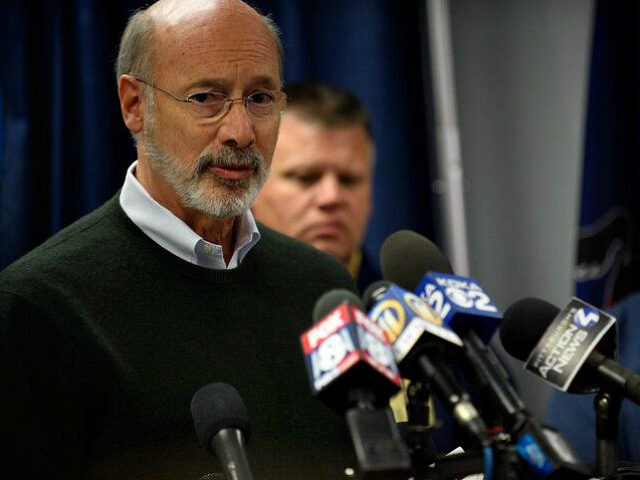Pennsylvania Gov. Tom Wolf (D) is facing sharp criticism over the details of his waiver program, exempting certain “non-life sustaining” businesses from his stringent shutdown orders, as thousands of business owners were denied exemptions for reasons that remain largely unclear.
On Friday, the Pennsylvania Department of Community and Economic Development released a list of the businesses that the administration granted waivers to, allowing them to remain open during the statewide shutdown. In mid-March, the governor ordered all non-life sustaining businesses to close shop.
“Yesterday, I made the difficult decision to order the closure of the physical locations of businesses that are not critical to sustaining life in a pandemic, and to practice social distancing for all others,” Wolf said of his decision.
“We’re in an unprecedented crisis and we need to use every tool at our disposal. The difficult decisions we make now will make it possible for our health care workers to manage this crisis as we see the full brutality of the virus in the coming weeks,” he added.
Rachel Levine, Secretary of the Department of Health, issued a similar order in March, suggesting in her letter that such businesses effectively increased the risk of contracting the Chinese coronavirus.
“Non-life sustaining businesses present the opportunity for unnecessary gatherings, personal contact and interaction that will increase the risk of transmission and the risk of community spread of COVID-19,” she wrote, failing to elaborate how, specifically, non-life sustaining businesses carried a greater risk of transmitting the virus than life-sustaining businesses, such as grocery stores.
“The closure of non-life sustaining businesses is necessary to protect the public’s health,” Levine added.
Shortly after issuing the order, Wolf indicated that non-life sustaining businesses could apply for a waiver to remain open — an option that ended April 3. Roughy 42,000 businesses applied for exemptions, but only 6,123 were officially granted the requests. However, that total did not match the previous tally.
PennLive reported:
In a press release Friday from the Department of Community and Economic Development, which spearheaded the waiver process, officials said they had approved 6,066 waivers. On its website, it said it had approved 6,104 (within an hour, that number had been updated to 6,123).
The change in the tally piqued the interest of state Sen. Scott Martin (R), who said he received word that the Wolf administration “revoked a local business waiver w/o notice or cause despite recent investments in perishables & their ability to adhere to CDC guidelines.”
“Was this a last second attempt to clean up the list?” he wondered:
Wolf’s administration has yet to explicitly detail why certain businesses received exemptions while others did not, as the specific criteria remains unclear. Republican lawmakers subpoenaed “for records related to the administration’s coronavirus waiver process,” as PennLive reported, but Wolf instead offered the list of businesses that received the waivers — not the criteria, leading to mounting claims of what critics say appears to be an arbitrary process. Meanwhile, “many businesses complained bitterly that there seemed to be no rhyme or reason to why some companies had received them, while others in the same industry were rejected,” the outlet added:
In at least two instances, Wolf yanked waivers for companies after Spotlight PA questioned why they had received them. One of those businesses was the cabinet supply company once owned by Wolf’s family.
Some businesses that were denied such waivers were “identical” to businesses located just miles away, which were granted their requests, Pennsylvania attorney Wally Zimolong, who filed a class action lawsuit on behalf of the businesses that were denied the waiver, told Breitbart News.
“These were competitors,” he explained.
“The release of the list only makes it worse – there are businesses on there like florists and bicycle shops,” Zimolong told Breitbart News. “Yet Governor Wolf and Secretary Levine remain unflinching and are keeping the entire state on lockdown because they say it is unsafe. Yet their actions clearly indicate to the contrary.”
The class action lawsuit was filed in the United States District Court for the Eastern District of Pennsylvania on Tuesday.
“We bring claims under the substantive due process clauses of the 5th and 14th Amendments and the equal protection clause of the 14th Amendment,” Zimolong explained.
Wolf has faced mounting pressure from individual counties across his state over his refusal to allow them to enter into the next phase of reopening. Some, such as Lebanon and Dauphin counties, plan to move into the next phase of reopening regardless of Wolf’s orders keeping them in the most restrictive “red” phase.
Wolf recently extended his stay-at-home order for counties under the “red” phase until June 4, stating, “We thought that another month made the most sense.”
But many business owners are reopening despite his orders.
“I had to save my business,” Julie Potter, owner of Blair County’s Tame Your Mane salon, told NBC Philadelphia this week. “I couldn’t let it end like that.”
“No one allowed us to do this,” Ray Ross, owner of Gorilla House Gym in Altoona, stated, according to the Altoona Mirror. “We did this on our own. We just decided to do it.”
Gorilla House Gym is also located in Blair County. While the county is among the 13 that Wolf is allowing to move into the “yellow” phase next week — Friday, May 15 — the phase still requires “gyms, spas, hair salons, nail salons and other entities that provide massage therapy), and all Entertainment (such as casinos, theaters)” to “remain closed.”
“We didn’t ask permission to do it. We just did it, and we’re going to keep doing it. Someone had to take a stand,” Ross added. “Enough is enough.”

COMMENTS
Please let us know if you're having issues with commenting.